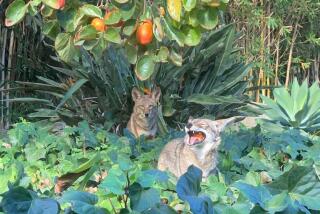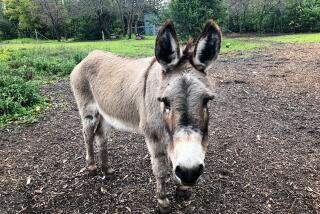Donkeys Kicking Coyotes Out of Pastures
- Share via
LOCKHART, Tex. — The much-maligned donkey is making a comeback in Texas and other states, where ranchers know that coyotes keep their distance when the stubborn beasts are around.
The “deliberate” disposition of the donkey and the animal’s innate dislike of canines make it useful for guarding goats and sheep against coyotes and other predators, rancher Nanci Falley said.
State officials say the donkey guard, an old-time form of protection, is enjoying a resurgence on ranches around the country.
“It’s such a natural thing for a donkey,” said Falley, who also sells the guard animals. “It’s not something that requires training. They have a natural instinct to run dogs and coyotes out of their territory.”
A well-placed kick from an angry donkey--also known as the burro, or ass--is usually enough to drive away any predator, experts say.
Ranchers have known this for years. But a new environmental consciousness has helped promote the use of predator controls such as guard animals instead of poisons that can enter the food chain. The low price of the donkeys does not hurt, either.
Prices range from $75 to $135 for females and $20 to $60 for males. About 1,800 of the animals now stand sentry on Texas ranches.
Groups such as the Montana-based American Council of Spotted Asses have been promoting use of the animals in other states as well.
The Texas Agriculture Department includes donkeys, mules and llamas in a comprehensive predator control program it launched in 1988. The program also employs traps, lights, sirens and propane cannons to frighten away coyotes and wild dogs.
Texas leads the nation in raising sheep, with 1.9 million, and angora goats, with 1.5 million. The Texas wool and mohair industries were worth a combined $66 million last year, officials said, but ranchers lost about $9-million worth of livestock to predators. Coyotes are blamed for more than half the damage.
That is where the donkeys come in.
Ranchers put a donkey out to forage with a herd. Soon the donkey “adopts” the flock as its own and begins defending it against coyotes and other canines.
The best way to choose a guard donkey is to let the animal get acquainted with its herd, then introduce a dog into its pen to see if it repels the canine.
“If the mule or donkey shows aggressive behavior toward the dog, then you’ve got a good guard donkey,” said Andy Field, predator management specialist for the Texas Agriculture Department.
Some ranchers report more success with jennies, or female donkeys, and geldings, neutered males. Some jacks, or intact males, are overly aggressive with their herds.
But Falley has raised donkeys for 23 years and said she does not believe good guarding is a sexually determined trait.
“I would say about 85% make real good guards,” she said as she stood in a corral with donkeys Mary Ann, Rachel, Hickory Jackson and Dandy.
Though the donkey of fable is obstinate and stupid, Falley, an inspector for the American Donkey and Mule Society, characterizes the animals as wise and regal.
“They don’t hurry. They do things in their own time,” she said, petting a month-old burro she calls “Little Toot.”
Falley said she began relying on donkeys to protect her goats and chickens after she moved to her ranch in Lockhart, northeast of San Antonio, in the 1960s and found that predators considered her livestock “groceries.”
More to Read
Sign up for Essential California
The most important California stories and recommendations in your inbox every morning.
You may occasionally receive promotional content from the Los Angeles Times.










